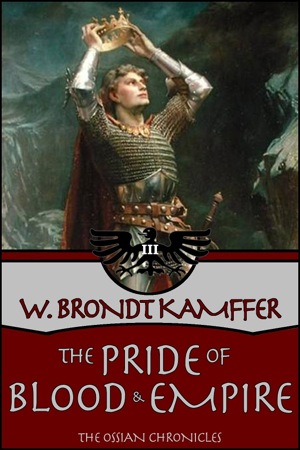 We have a guest post today from up-and-coming indie fantasy author, W. Brondt Kamffer, someone I’ve come to know through Twitter and his blog. He posts a mix of book reviews and podcast episodes, all geared toward his target audience: fantasy readers and writers.
We have a guest post today from up-and-coming indie fantasy author, W. Brondt Kamffer, someone I’ve come to know through Twitter and his blog. He posts a mix of book reviews and podcast episodes, all geared toward his target audience: fantasy readers and writers.
He’s here today to talk about podcasting and how it can help with book promotion.
A Podcast as a Brand Builder
True story: I began a podcast because I disliked writing blog posts.
Another true story: I still write two blog posts (at least) for every podcast episode I produce.
Lesson learnt: While a podcast can be a great addition to your brand-building arsenal, it will by no means replace what you are doing now.
When I began producing my podcast, Gods and Men, I wanted to think of something that was different, that nobody else was doing. This is a bit like all our writerly blogs out there. So many are talking about the publishing business or process, or reviewing books, or about themselves. There seems to be little variety, but every now and then, somebody comes along and does something you’ve either not seen before or not seen enough of.
Sure, you say, it’s easy for a non-fiction writer to blog/podcast. All he has to do is theme his blog/podcast along the lines of what he writes, and thus it becomes a supplement. But fiction authors have so much to talk about too. Sarah Woodbury, for example, is an indie author who writes historical fiction set in medieval Wales and she blogs about medieval Welsh culture and history.
I wanted to try something like that for my genre, fantasy, and so conceived of a podcast that would–wait for it–talk about fantasy. But I drew on more than that. I also lecture university English, and I have been appalled to learn of the low status speculative fiction has in academics, so I thought I could bring my academic background to a discussion of fantasy, and thus arrived at a podcast that examines fantasy as literature. I have discussed themes, motifs, world-building, and such matter, and I am currently in the middle of an eight-part lecture series on Tolkien’s The Children of Hurin.
So, why do I tell you this? Simply, that unless you want to be a professional podcaster, as an author you’ll want to use your podcast to draw attention to your writing. Now, is my way the only way? Certainly not. But you do want to think about your goals, and those goals need to include brand building, name recognition, or whatever you want to call it. The same logic that holds for your blog, holds for your podcast.
As I said, mine is just one type of podcast. There are many you could attempt, and many authors have used such routes to generate interest in their own work. Joanna Penn and Moses Siregar III, for example, are each podcasters who interview other authors. Nathan Lowell famously podcast audio versions of his novels, and now his ebooks sell by the hundreds, yea thousands. Jennifer Hudock is part of a weekly roundtable podcast with two other authors, and she too has done well for herself.
The point is that creating a podcast is just another way to draw attention to yourself and your works, and like your blogging habits, or online social networking, you want to be careful of how you present yourself. For example, in my case, I abandoned any attempts at self-producing an audio book because I have a terrible reading voice. I get all monotonous and sound absolutely disinterested (listen to my lectures on The Children of Hurin, where I read some excerpts, and you’ll know what I mean). This is not the best advertisement for my work.
On the other hand, when speaking off the cuff, I sound much more natural, and while my podcast doesn’t necessarily advertise my books directly, I’d like to think that someone listening to my episode on, say, motif will get the sense that I know what I’m talking about and that perhaps my own books won’t be half bad as a result. Isn’t that the same hopes for writing your blog?
A podcast is an advertisement, essentially, only a different sort of advertisement than your blog. Used wisely, it can be a great way to lure in readers to your real produce: the books. But even if that doesn’t work out (and I have found that it is a slow process, like anything else, attracting listeners), it is one heck of a journey. There are many things I regret having done in my life, but starting the Gods and Men podcast is definitely not one of them.
You can check Brondt’s ebooks on Amazon and grab his newest release, The Call of Sage and Kindred, for free on Smashwords (99 cents on Amazon).





Pingback: The Pride of Blood and Empire Blog Tour « Gods and Men
All success, W. 🙂 I’ll have to check out your reads.
Thanks, Mary.
How much work is involved with putting out a podcast on a regular basis? Do you get a lot of listeners because of being in the iTunes store or do you still have to work to promote your podcast?
Loren,
Producing a half-hour episode takes about two hours: 20-30 mins to plan the episode; 40 mins to record; about 1 hr to edit and convert. After a few episodes, I had everything down to a fine art, so spend less time on editing than I did early on. Also, as my presentation has gotten better, I find I make fewer mistakes in recording, which means I also have to spend less time editing. My rule of thumb is that editing takes two minutes for every one minute of recording, at least.
As to your question about iTunes, the store is as cluttered as, say, Amazon, which means you won’t just be found. Most people, to my knowledge, who listen through iTunes found the podcast through my website first and not the other way around. You do need to promote, as with anything, but there’s no need–in my case–to really be aggressive about it. The idea is that my show notes (brief as most are) help to place the episode on a Google search, which is how almost everyone has found the podcast, as far as I can tell.
Dang Brondt, you’re a busy and productive person! It’s great that you’re approaching fantasy from an academic angle, I don’t see that sort of discussion enough.
I’d like the point out that having a good podcast/blog in itself is good promotion in the long-term. Even if not all followers check out the main produce (the books), if these followers hang on for a while, they’ll talk about it to people in their circle, and those people may in turn check out the books when they wouldn’t have done so otherwise. It’s all long-term stuff, so the act of working on those advertising-projects needs to be rewarding to the creator.
Getting kinda meta here, but it’s like Lindsay and this blog as part of her author platform. This blog has a very good reach because there’s high quality posts about marketing for e-published authors, and every time a blog post gets retweeted and such, it reaches more people who could be interested in those books on the side.
Also, I’ve added your blog to the Indie SF Reviewers list 🙂 How do you manage your time with your day job, book writing, podcasting, blog writing, and book reviewing? You state on your book submissions page that you respond to all queries promptly. If I did that, I’d have no time to actually read/review books @_@ Are you able to deal with scope creep because you have a tightly defined focus? E.g. reviewing epic/high fantasy only?
Frida,
The whole long-term thing is the idea behind the podcast, and as the web gets a bit larger each week, I do snare new readers/listeners who Googled and found my site because I’m only one of a few talking about fantasy academically. For example, I get several visitors a week who come via a Google search for “fantasy motifs.”
As for the reviewing (thanks for adding me to the list, btw), I think the tight focus definitely helps. I do read a lot, though, so I cover quite a bit in short amounts of time. I don’t watch TV or hang out at the beach or otherwise waste time. If I’m not writing or working, I’m typically reading. Once the fall semester starts up, I’ll likely slow down, as I won’t have nearly the time I have over the summer, but I plan to keep everything going at nearly the same pace through the winter at least, then reassess.